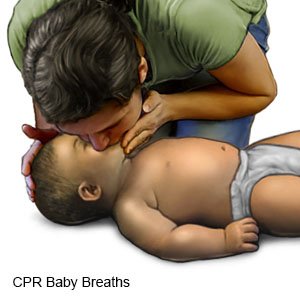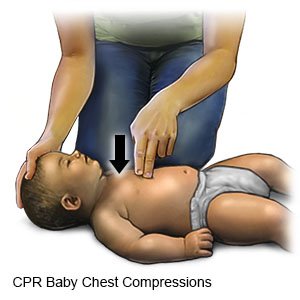Home Apnea Monitor for Infants
Medically reviewed by Drugs.com. Last updated on May 6, 2024.
What is an apnea monitor?
An apnea monitor is a device that monitors how well your baby is breathing. The apnea monitor is connected to your baby's chest with a belt or sticky pads. The belt and sticky pads have sensors that measure your baby's breathing rate and heart rate. The monitor alarm will sound when your baby stops breathing or takes shallow breaths. It will also sound if your baby's heart rate is lower or higher than it should be.
Why may my baby need an apnea monitor?
- Your baby was born prematurely. Babies who are born before 37 weeks are at risk for apnea. Apnea is a period of shallow breathing or no breathing. Your baby's heart rate may decrease when he or she stops breathing.
- Your baby had a brief resolved unexplained event (BRUE). A BRUE is when your baby suddenly stops breathing and will not respond.
- Your baby's sibling died from sudden infant death syndrome (SIDS). SIDS is the sudden death of a sleeping baby younger than 1 year. The death cannot be explained.
How do I use an apnea monitor?
You will be taught how to use the monitor before your baby leaves the hospital. You will be taught how to attach the monitor to your baby and what the alarms mean. You will also be taught what to do if the monitor alarm sounds. Check the monitor's user manual if you forget any directions. Your baby's healthcare provider will tell you when to use the monitor. The provider may tell you to use the monitor all of the time or only while your baby is sleeping.
What can I do to keep my baby safe while I use an apnea monitor?
- Place the monitor on a firm, sturdy surface. Make sure the monitor cannot fall into your baby's crib.
- Do not place the monitor near your baby's head. The alarm can be very loud and may damage your baby's hearing.
- Keep the wires away from your baby's head and neck. This will prevent them from strangling your baby.
- If the monitor uses a belt, make sure you can fit 2 fingers between the belt and your baby's chest. A tight belt may prevent your baby from breathing well.
- Make sure you can hear the monitor's alarm from another room. Place a baby monitor near the apnea monitor if you cannot hear the alarm from another room. This will help make the alarm louder. Check the monitor's instructions for how far apart you should place the monitors.
What should I do if the apnea monitor alarm sounds?
- Check your baby every time the monitor alarm sounds. A false alarm may be caused by a belt or sticky pad that falls off. A false alarm may also be caused by a low battery. Make sure your baby is attached to the monitor and the battery is charged.
- If your baby has stopped breathing, stay calm. Follow the instructions given to you by your baby's healthcare provider. The provider may tell you to gently rub your baby's back, arms, or legs to make him or her breathe. Never shake your baby. This can cause brain damage. Press the reset button on the monitor after your baby starts breathing.
- If your baby does not start breathing after you have followed the instructions, start CPR and call 911.
How do I give my baby CPR?
- Start CPR before you call 911 if you are alone when you find the infant. If you are with another person, one person can start CPR and the other can call 911 or go for help.
- Learn the steps used to give CPR to infants by remembering C-A-B. This stands for chest C ompressions, A irway, and rescue B reathing. Do 30 compressions immediately. Then open the infant's airway. Hold the airway open and give 2 rescue breaths. A cycle is 30 chest compressions and 2 rescue breaths.


- Do chest compressions even if you cannot give rescue breaths. Chest compressions alone make it more likely that the infant will live than if you do nothing at all.
What can I do to care for my baby's skin while I use the monitor?
- Do not put powders or lotions on your baby's skin before you attach the monitor. These will prevent the sensors from working correctly.
- If the monitor uses sticky pads, remove and replace them as directed. Do not change the sticky pads more often than the provider says is okay. You could irritate your baby's skin.
Call your local emergency number (911 in the US) if:
- Your baby cannot be woken.
- Your baby stops breathing and you cannot get him or her to breathe.
When should I call my baby's pediatrician?
- Your baby's heart rate is higher or lower than the pediatrician said it should be.
- You have questions about how to use the apnea monitor.
- You have questions or concerns about your baby's condition or care.
Care Agreement
You have the right to help plan your baby's care. Learn about your baby's health condition and how it may be treated. Discuss treatment options with your baby's healthcare providers to decide what care you want for your baby. The above information is an educational aid only. It is not intended as medical advice for individual conditions or treatments. Talk to your doctor, nurse or pharmacist before following any medical regimen to see if it is safe and effective for you.© Copyright Merative 2024 Information is for End User's use only and may not be sold, redistributed or otherwise used for commercial purposes.
Further information
Always consult your healthcare provider to ensure the information displayed on this page applies to your personal circumstances.
